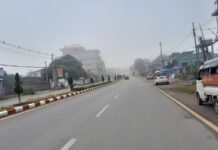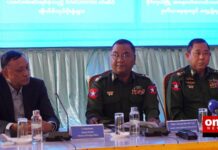Regarding the implementation of the Nationwide Ceasefire Agreement (NCA), during the latest Union Peace Dialogue Joint Committee (UPDJC) meeting in Naypyitaw, on October 30-31, two most important issues popped up that need to be resolved quickly, if the upcoming Union Peace Conference-21st Century Panglong (UPC-21CP) earmarked for this coming December is to be successful.
One of the said issue is on how the Pyidaungsu (Union) Accord endorsement procedure be handled properly, as there was a big argument during the last UPC-21CP in May, when the first portion of Union Accord with 37 points was rejected by most of the participating Ethnic Armed Organizations (EAOs) and political parties, stating irregularities and not been according to the NCA procedure.
Another issue is the rejection of the Restoration Council of Shan State (RCSS) and the Arakan Liberation Party (ALP), both the NCA signatories, by the government to conduct their national level – actually more appropriate to be termed sub-national level or state level – political discussions as prescribed by the NCA guidelines.
To understand the problematic national-level political discussions of the RCSS and ALP, it is essential to look at the NCA setup.
 NCA setup and national level political dialogue
NCA setup and national level political dialogue
The UPC-21CP is conducted according to the NCA-based approach.
The highest organ in the NCA is the Joint Implementation Committee Meeting (JICM). Under the JICM is the Union Peace Dialogue Joint Committee (UPDJC) and the Ceasefire Joint Monitoring Committee- Union (JMC-U).
UPDJC again is responsible for drawing the Framework for Political Dialogue (FPD) and steering the whole peace process in UPC-21CP.
The JMC-U is only concerned with the military matters between the Military (Tatmadaw) and the EAOs.
According to the FPD, national level political dialogues are to be held in tandem or simultaneously with union peace conference, as could be seen below in chapter 3.
“(a) To write and agreed on the Framework for Political Dialogue (b) To hold national level political dialogues and union peace conference (c) To sign the Pyidaungsu Accord (d) To submit the accord to the Pyidaungsu Hluttaw for ratification (e) To implement the agreements of the Pyidaungsu Accord.”
Again in Chapter 4, it explicitly mentioned: “In line with the basic guidelines laid down by the UPDJC, the working committees may hold the national level political dialogues in groups or in single group of governments, ethnic armed groups and civil society organizations from states and regions.”
RCSS and ALP
However, the Tatmadaw and the government have so far blocked the national level political discussion of the RCSS, due to the disagreement on the choice of conference venue.
The RCSS prefers to either hold the Shan National Conference in Taunggyi, the capital of Shan State, or Panglong, the historical town where the 1947 Panglong Agreement was signed, but was rejected by the Military and instead proposed a small place called Mong Pan, without adequate facilities to entertain a huge gathering of nearly a thousand delegates.
Regarding this disagreement Sai Ngyen, general secretary-3 of RCSS recently said: “As before, no decision could be made. We cannot adjust to the government-Tatmadaw position to hold (the conference) in Mong Pan, as we are for holding it in Taunggyi.”
The argument from the Tatmadaw part seems to be more on its reluctance to give the gathering a boost of publicity and unified political demand, including the posturing to show that it is calling the shots in Shan State, than its argument that the RCSS should conduct the meeting in its area only.
But this is being countered by the Shans, arguing that it is not just a military matter but concerns all Shan nationals said the Committee for Shan State Unity (CSSU), an umbrella organization that includes three Shan political parties, two Shan armies and many Civil Society Organizations.
Likewise, the ALP has also been denied national level dialogue to be held in Arakan State. The government reason this time is security concern, even before the recent Rohingya crisis started in August.
Accordingly, the ALP sent a letter in early September saying it would like to hold the Arakan national political dialogue to the Government’s Peace Commission but has not yet been confirmed, said Saw Mya Yazar Lin, CEC member of the ALP.
Saw Mya Yazar Lin on November 5 told the Eleven Media Group: “In reality this is the weak point from the side of the government. Without concrete reason, it is refusing (the national-level political dialogue) and saying that it will continue to strive for it to happen.”
She went on to say the rejection argument that there is no peace shouldn’t be the reason and instead should focus on the nature of whether it compliments or empower the peace process by holding such dialogue at state level or not.
She stressed: “Another point is the commitment to establish the peaceful Union. And I see if we are toeing this commitment, we should conduct the political dialogue in Arakan and Shan States and continue striving for it.”
Reportedly, during the latest 12th UPDJC meeting, which is made up of the tripartite government, parliament,Tatmadaw; the signatory 8 EAOs; and political parties; no decision could be made regarding national level political discussion, particularly for the RCSS and ALP.
Analysis
The complication in rejecting the national level dialogue has two folds. One is that it is going against the NCA procedure and the other, without being able to conduct national level political dialogue, the ALP and RCSS cannot participate effectively and wholeheartedly without inputs from their basis in the UPC-21CP. This in turn would again lead to the rejection of the Union Accord, as could be seen in the last UPC-21CP.
The UPDJC should be able to tackle this disagreement, but since the FPD is yet to be finalized and the guidelines of standard operating procedure not in place it is impossible to handle the situation in a fair manner.
Moreover, the government and Tatmadaw making decision on such argument is inappropriate as both are supposed to be equal negotiation partners like the EAOs, according to the NCA.
And since, the problem of ALP and RCSS could not be decided at UPDJC level, it is now resolved to tackle it at the highest JICM level before the next UPC-21CP in December.
For now, it looks like until the said problem of conducting national level political dialogue is resolved, the stagnation of the peace process will continue.












Leave a Comments